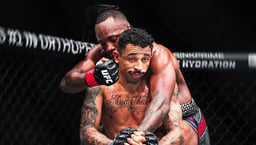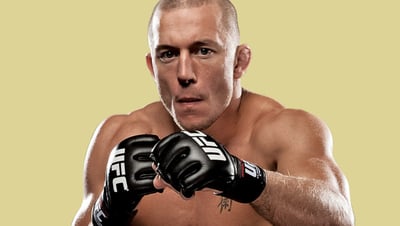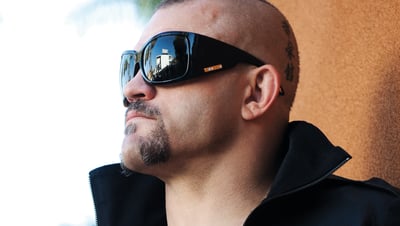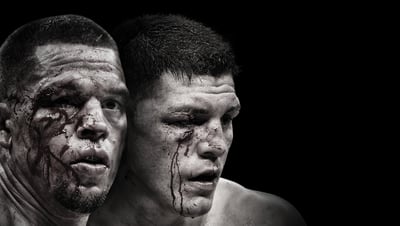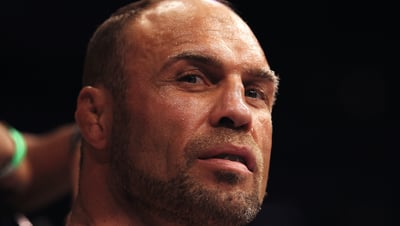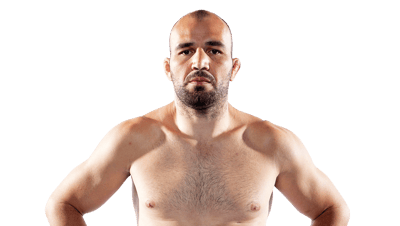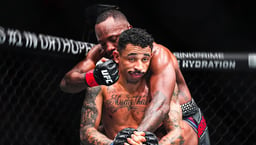
Issue 110
January 2014
As much as Nick Diaz is loving his new-found liberty in retirement, in a rare and exclusive interview, the former UFC welterweight contender reveals to FO he’s ready to return to the Octagon – but only against a worthy opponent.
Nick Diaz is at a crossroads, not just in his career but in life as a whole. Given his demeanor and relative youth, people sometimes forget he is a veteran of the sport who started fighting in 2001, shortly after his 18th birthday. Having trained seriously for several years previously, Diaz has devoted all of his adult life and a good chunk of his adolescent one to the fight game.
Following his failed attempt to take the UFC welterweight title from Georges St Pierre at UFC 158, Diaz announced his retirement during his post-fight speech. He said that the sport had become something he no longer enjoyed, and that he had no interest in fighting UFC newcomers and being used to build up their reputation.
As with many things Diaz, the lines are somewhat blurred. In the course of this rare interview, Diaz tells Fighters Only that retirement is not final and that there are conditions under which he could be persuaded back into the cage.
“It’s kind of hard to retire from MMA,” he says. “There’s always something to do. I am always going to be around it, like the fact my brother is in training camp right now because he has a fight coming up, so I’m training with him.
“I wouldn’t mind taking a fight if it’s a big fight that people are going to make a big deal out of. If not then it’s not really worth it to me. I’m not trying to do too much right now.”
Diaz’s previous comments on what he perceives as the descent of MMA into point-fighting have been well documented. He was openly disgusted by the tactics Carlos Condit used against him at UFC 143 and was equally bewildered by the judges rewarding the ‘Natural Born Killer’ with a decision victory.
Almost two years on from the Condit fight he’s a little reticent, unusually for him, about going over old ground, saying: “I’ve talked about that a lot already.”
But the mercurial 31-year-old is more than willing to confirm that his general dissatisfaction with the increasingly tactical nature of MMA was a catalyst in his announcing retirement.
“I don’t know if I like the way the sport is turning into something different from when I got started,” he says. “And I think it’s a good time for me to take it slow as well, you know? There’s a lot of stuff I’ve got going on that I’m coming to an understanding with so I’m trying to take it all one step at a time, thinking about things which have happened.”
Those “things which have happened” encompass a lot of Diaz’s somewhat scatterbrained nature, which is famous among MMA fans. While he’s talking, topics will float to the surface of his mind, seemingly at random, and will be dived upon immediately before sinking into the darkness again and being replaced by a new subject.
This lends his conversation a stream-of-consciousness quality which, once tuned into, can often reveal unexpectedly solid insights. More than one observer has mistakenly confused Diaz’s difficulties with concise articulation for a lack of intellect. But he is by no means unintelligent, and he is very much aware he has a reputation for social awkwardness.
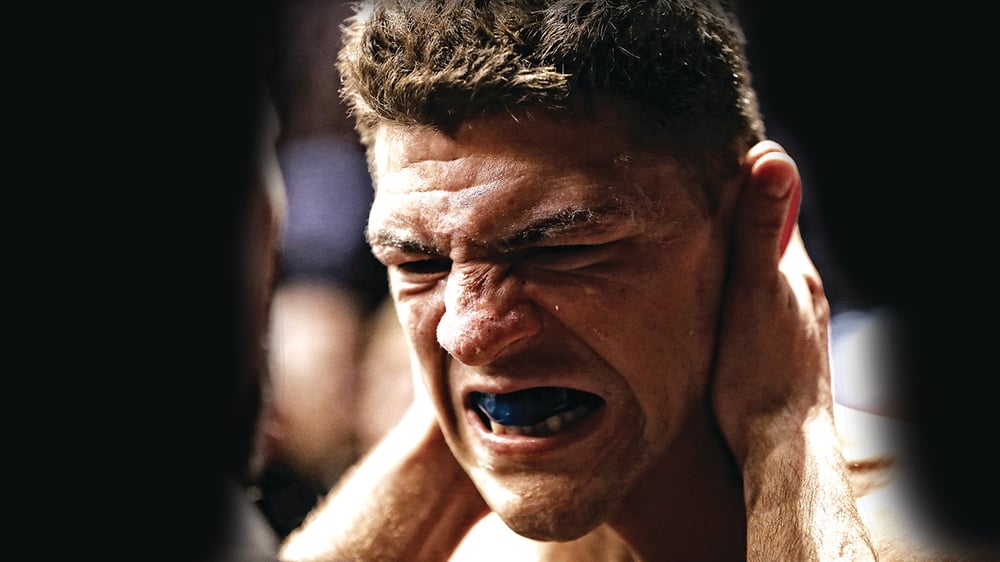
Diaz has a theory on the roots of that. He discovered Brazilian jiu-jitsu and the sport of MMA during troubled teenage years. It became one of the few things in life, up to that point, that made sense to him and so he immersed himself in it entirely. So much so that the wider requirements of society, such as attending school, were pushed firmly into second place, if not completely disregarded.
“As a teenager, I did so much training and so much not going to school, doing nothing but jiu-jitsu all the time… I mean, it was good but I limited myself from certain aspects of life like actually going to school, being able to deal with people and stuff,” he says.
“I had to learn that backwards, almost. I learned it on the mat. But time goes by, life goes on and there is more to living than being a fighter. You are going to exclude yourself from a lot of things by only doing that one thing.”
There’s a tone of regret in Diaz’s voice and he admits its presence. Only lately, thanks to his quasi-retirement, has he been able to look up from the treadmill long enough to see that there is a wide world around him, one which doesn’t require the monastic rigour and seclusion of a perpetual training camp.
“This is the only time in my life that I’ve ever had any time to myself,” he says. “I’ve had a fight every three months since forever. Try and put that together in your mind. I didn’t even notice this, my girlfriend pointed it out when she said, ‘In 2002 you had six fights in one year, I don’t understand that.’
“Now I am starting to get it. What the f**k happened? All I did was a whole bunch of ‘never back down’; I would just take the fight even though I am not supposed to win, never ever. That will make you crazy. People say I am crazy and I’m like, ‘Yeah, maybe a little,’ you know?”
And so the Diaz of today is about living life a little more fully. Having finally realized the enormous pressures he has been putting himself under since his late teens, he is now warning fighters who come to train with him not to make the same mistakes.
“People shut themselves down, they are just in training camp all the time, and I’m like, ‘Hey, you can go crazy like that.’ As far as I’m concerned you are not going to stay sane,” he explains.
“Like my friend, Cameron, who came out and stayed at my house and turned it into his training camp. Everything was hard for him and he made it harder by shutting himself off from things. We were saying, ‘Hey, chill out, come and hang out with us.’
“He was like, ‘No, I’m going to stay here and be dedicated,’ and I’m like, ‘Dude, you’re killing yourself.’ These things can make you crazy.”
Diaz knows only too well what it is like to miss out on normal parts of life, normal parts of growing up. There is a certain amount of sacrifice involved in being a professional athlete of any discipline, but there is also a balance to be struck. Diaz isn’t sure he got it right.
“Like, I would always go with my friends, or whatever, to this place near where we lived called Candy Rocks and we would slide down the rocks and stuff, mountain stuff, everyone partying, beers and going in the water,” he remembers.
“It’s a party spot, everyone goes there. But I would have to do a workout. I’d go along with my friends because I didn’t want to get left out but I would have to get a workout in because I had a fight coming up. So it’s like a mile climb down the rocks to this water, I would go up and down that s**t eight or nine times to get a workout.
“My friends would be asking why I was doing it, like I was trying to impress people or something. But I wasn’t trying to impress anyone, I just needed to get the workout in because otherwise I was going to get my ass whupped when it came to the fight. So I would make it out there and hang out a bit, but if my training was like 85% of my time I’d only have that 15% left for my friends, you know what I mean? That leftover percentage was all there was for hangout time, or even sleep time.”
Time is one concern, money is another. We’ve all heard Diaz railing about “driving a s**ty Honda” and talking about wanting to be “properly compensated” for his fights.
But he says his comments about money haven’t necessarily been aimed at the UFC. Mostly it is the MMA industry and sponsorship market which Diaz feels is overlooking him.
“When I say I don’t get any pay I am more talking about sponsorships and other cool stuff that I see other people doing,” he says. “So when I’m throwing a fit that’s usually what I am talking about. It’s not about TV, I know I’m on TV.
“I know I have knockouts, I know I am on highlight reels, so why am I not the guy that everybody is coming to? Companies like Nike and Adidas. So that’s pretty much where I’m up to. They wonder why I’m mad after a show; these are the kind of reasons. It’s an expression of what’s happening, what’s going on in my mind at the time.”
Diaz would like the money, respect and recognition that comes with being used for endorsements and advertising, but he isn’t going to attach his name and face to just anything. Much of the product line he is presented with by prospective suitors seems ridiculous to him.
“Recently, this guy was trying to push this product for me to endorse. It was like a taekwondo paddle, like one of these things you kick? It was cool, I guess, but I don’t think people are going to make that big of a deal about it,” he explains.
“He was saying it’s gonna revolutionize the sport and all this and I was like, ‘Give me a break. But I hate it so MMA fans are probably going to love it. It will probably do well because I think it’s f**king ridiculous.’ He was like, ‘Well, thanks for your honesty.’”
The man with the revolutionary taekwondo pad never called back. And perhaps that’s where the disconnect lies. Diaz is a robust straight talker, while many people in the marketing and advertising world are at best disingenuous, at worst outright snake-oil salesmen. On top of that, Diaz thinks the advertisers have simply gotten away from the core values of sport, toughness being one of them.
“I go to bookstores and stuff, like Barnes & Noble, because I get around, I don’t just stay inside my house. And I pick up a magazine and flick through it and they are advertising s**t but they don’t want to use me; they don’t want to pay me money because I’m not the image they are looking for, or whatever,” he says.
“That’s not good though. There should be something for everybody – you get a lot of different types of people. You get, like, different styles. People want to come with different styles so you want to be able to market to every different style out there and they are totally missing a whole aspect of who is going to be a strong face for them.
“In the boxing world there is a whole image or swagger, call it what you will, that goes along with it, and a lot of marketing strength comes out of that aspect of the sport. People are going to have to tap into that aspect and bring it back to MMA whether they like it or not.
“These people, you’re gonna have to have something to market to them and get them going. For instance, myself and a lot of other fighters out there, we are not being catered towards when it comes to style, what’s new and what’s hot.”
Does Diaz see this changing any time soon? He does not. “Nobody wants to use me, but I don’t want to use them either,” he says. “I don’t chase after them because I think their stuff sucks. There ain’t nothing for me a lot of the time.”
And so we find ourselves back at Diaz’s crossroads, and it’s a frustratingly unsignposted one. He is enjoying retirement but wouldn’t mind big-name fights. He would like advertisers to court him, but he thinks most of what’s being sold is crap. As ever with Diaz, things are a mass of contradictions.
But as much as he expresses regrets about opportunities missed in his younger years, right now he has his girlfriend beside him and free time to spend for the first time in his life. That’s about as rich and happy as Nick Diaz has ever been, and he’s making the most of it.
...

